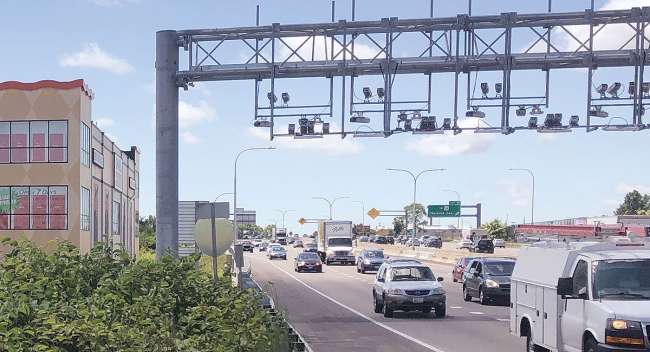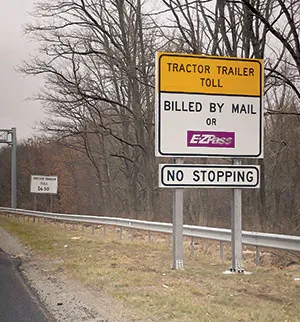Senior Reporter
Appeals Court Hears Arguments on Rhode Island Tolling Plan

[Stay on top of transportation news: Get TTNews in your inbox.]
Attorneys for American Trucking Associations and the Rhode Island Department of Transportation sparred in oral arguments before a federal appeals court over whether the state’s trucks-only tolling plan discriminates against out-of-state heavy trucks traveling in the state.
In a hearing Sept. 12, the two sides attempted to convince a three-judge panel of the U.S. Court of Appeals for the First Circuit whether a federal district judge had fairly ruled in favor of ATA’s court challenge that the plan was discriminatory.
The lawsuit, filed more than four years ago by ATA and two motor carriers, alleged that the hotly contested tolling plan required out-of-state heavy trucks to pay nearly all of the tolls, while mostly exempting state businesses, cars and intrastate motor carriers.
However, in a 181-page briefing document, filed Feb. 10 with the U.S. Court of Appeals for the First Circuit, RIDOT asked that the Sept. 21, 2022, decision by District Judge William Smith declaring the program unconstitutional be reversed.

A truck toll information sign on a Rhode Island interstate. (TT File Photo)
The trucks-only tolling system was part of then-Gov. Gina Raimondo’s broader “RhodeWorks” program, which had been projected to generate $4.7 billion to finance infrastructure projects.
In his ruling, Smith wrote: “Because RhodeWorks fails to fairly apportion its tolls among bridge users based on a fair approximation of their use of the bridges, [it] was enacted with a discriminatory purpose, and that the statute’s tolling regime is unconstitutional under the dormant Commerce Clause of the United States Constitution.”
But in oral arguments, RIDOT attorney Ian Gershengorn asked the appellate panel to reverse Smith’s ruling.
“Rhode Island’s Legislature imposed a facially neutral toll on the biggest trucks that caused the most damage to Rhode Island’s transportation infrastructure,” Gershengorn told the panel. “In striking down the legislation, the district court misapplied the Commerce Clause and it took for itself decisions that belong to the state’s elected representatives.”
Gershengorn said the district court erred in holding that the tolls are discriminatory because there was no evidence produced at the district court level that the tolls give in-state competitors an advantage over out-of-state competitors who use big trucks, and that the tolling plan was “not discriminatory in the constitutional sense.”
He also said the Legislature’s decision to put a use-based toll on the biggest rigs that cause the most damage was not “wholly unreasonable or irrational,” noting that there also was no evidence presented that small trucks and bigger trucks compete or that tolls give state trucks an advantage.
“Mere disparate impact on state residents is not unconstitutional,” Gershengorn added.
However, in court documents ATA has argued that Rhode Island “effectuated this discrimination by tolling only trucks, exempting those trucks most likely to be owned by in-staters, and then capping the tolls in ways certain to disproportionately benefit in-staters.”
The district court found as fact that RhodeWorks was designed to discriminate, ATA has argued. “The state set out to export its tolling burden to out-of-staters; state officials carefully designed RhodeWorks to do that; and as structured, the tolls inevitably have the effect of disproportionately burdening out-of-state and interstate trucks.”
Want more news? Listen to today's daily briefing above or go here for more info
In oral arguments, ATA attorney Charles Rothfeld countered Gershengorn’s argument, with claims that the Legislature’s intent was clearly to place the tolling burden on heavy out-of-state truckers.
“It’s designed so that a higher percentage of those that pay are out-of-staters, rather than in-staters,” he said.
“As to the large trucks, there is no question that Class 8 trucks compete, whether they’re in-state or out-of-state,” Rothfeld told the panel. He also disputed claims by the state that heavier Class 8 trucks necessarily do more damage to bridges than Class 7 trucks because the actual damage caused by weight depends on the number of axles on a truck.

